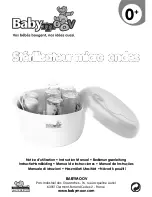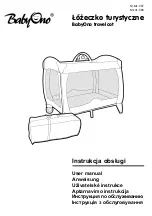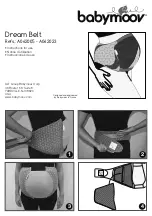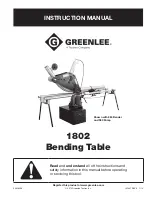
WIRING GUIDE
All wiring must be installed in compliance with the National Electrical Code,
applicable local codes, and any special requirements of the Authority Having
Jurisdiction. Proper wire gauges should be used. The installation wires should
be color-coded to limit wiring mistakes and ease system troubleshooting.
Improper connections will prevent a system from responding properly in the
event of a fire.
Remove power from the communication line before installing sensors.
1. Wire the sensor base (supplied separately) per the base wiring diagram.
(See Figure 1.)
2. Set the desired address on the sensor address switches. (See Figure 2.)
3. Install the sensor into the sensor base. Push the sensor into the base while
turning it clockwise to secure it in place.
4. After all sensors have been installed, apply power to the control panel and
activate the communication line.
5. Test the sensor(s) as described in the TESTING section of this manual.
FIGURE 1. WIRING DIAGRAM
2
3
1
2
3
3
1
2
1
(–)
(+)
+
-
UL LISTED COM
PA
TIBLE
CONTR
OL
PA
NE
L
CLASS A OPTIONAL WIRING
REMOTE
ANNUNCIATOR
(–)
(+)
C0129-04
CAUTION
Do not loop wire under terminal 1 or 2. Break wire run to provide supervision
of connections.
FIGURE 2. ROTARY ADDRESS SWITCHES
TENS
ONES
9
10
11
12
13
14
15
8
7
6
5
4
3
2
1 0
9
8
7
6
5
4
3
2
1 0
C0162-00
SPECIFICATIONS
Operating Voltage Range:
15 to 32 VDC
Operating Current @ 24 VDC:
200 uA (one communication every 5 seconds with green LED blink on communication)
Maximum Alarm Current:
2 mA @ 24 VDC (one communication every 5 seconds with red LED solid on)
Maximum Current:
4.5 mA @ 24 VDC (one communication every 5 seconds with amber LED solid on)
Operating Humidity Range:
15% to 90% Relative Humidity, Non-condensing
Operating Temperature Range:
32°F to 115°F (0°C to 47°C)
Air Velocity:
0 to 300 ft./min. (0 to 91.4 m/min.)
Height:
2.0˝ (51 mm) installed in B300-6 Base
Diameter:
6.2˝ (156 mm) installed in B300-6 Base; 4.1˝ (104 mm) installed in B501 Series Base
Weight:
3.4 oz. (95 g)
Isolator Load Rating:
0.0063*
*Please refer to your isolator base/module manual for isolator calculation instructions.
UL 268 listed for Open Air Protection
UL 268A listed for Duct Applications
UL 521 listed for Heat Detectors
This sensor must be installed in compliance with the control panel
system installation manual. The installation must meet the require-
ments of the Authority Having Jurisdiction (AHJ). Sensors offer maxi-
mum performance when installed in compliance with the National
Fire Protection Association (NFPA); see NFPA 72. For a complete list
of compatible bases, refer to the Base/Sensor Cross Reference Chart at
systemsensor.com.
GENERAL DESCRIPTION
Model MRI-2351TIRAP is a plug-in type multi-criteria smoke sensor that of-
fers a photoelectric sensing chamber combined with a 135°F (57.2°C) fixed
temperature heat detector and infrared (IR) sensors. The MRI-2351TIRAP also
transmit an alarm signal due to heat (135°F/57.2°C) per UL 521.
All sensors transmit an analog representation of smoke density over a commu-
nication line to a control panel. Rotary dial switches are provided for setting
the sensor’s address. (See Figure 2.)
Two LEDs on the sensor are controlled by the panel to indicate sensor status.
An output is provided for connection to an optional remote LED annunciator
(P/N RA100Z).
Secutron panels offer different features sets across different models. As a
result, certain features of the photoelectric sensors may be available on some
control panels, but not on others.
MRI-2351TIRAP supports Advanced Protocol and CLIP (Classic Loop Interface
Protocol) mode. The possible features available in the multi-criteria smoke
sensors, if supported by the control unit are:
1. The sensor’s LEDs can operate in three ways—on, off, and blinking–and
they can be set to red, green, or amber. This is controlled by the panel.
2. The remote output may be synchronized to the LED operation or con-
trolled independent of the LEDs.
3. Devices are point addressable up to 159 addresses.
Please refer to the operation manual for the UL listed control panel for specific
operation. The photoelectric sensors require compatible addressable com-
munications to function properly. Connect these sensors to listed-compatible
control panels only.
SPACING
Secutron recommends spacing sensors in compliance with NFPA 72. In low air
flow applications with smooth ceilings, space sensors 30 feet apart (9.1 m).
For specific information regarding sensor spacing, placement, and special ap-
plications, refer to NFPA 72 or the System Smoke Detector Application Guide,
available from Secutron.
I56-6736-000
INSTALLATION AND MAINTENANCE INSTRUCTIONS
MRI-2351TIRAP
Advanced Protocol
Multi-Criteria Photoelectric,
Thermal and Infrared Sensor
25 Interchange Way, Vaughan ON, L4K 5W3
PH: 905-695-3545
1
I56-6736-000
10/14/2020






















